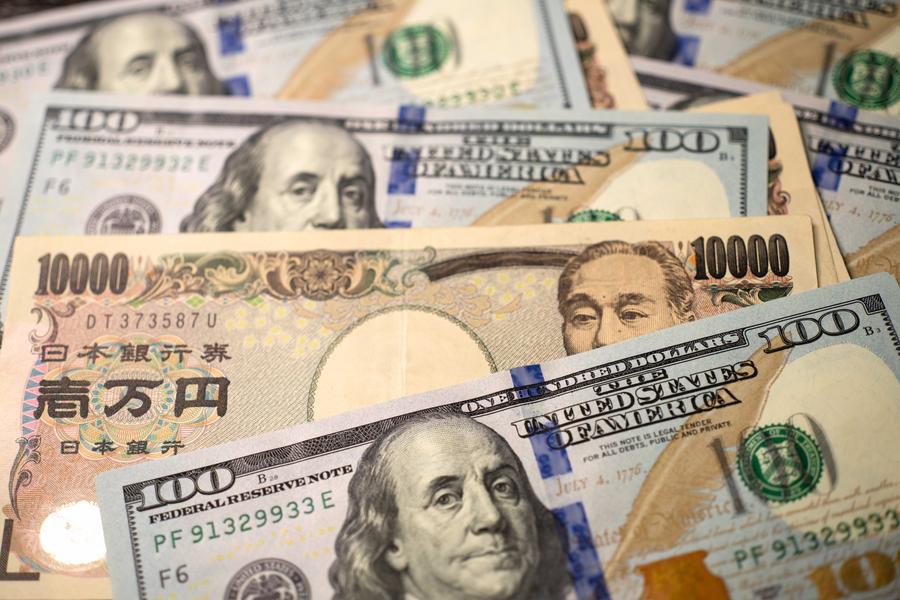
Local analysts believe that the yen's appreciation in the future is inevitable, but Japan can hardly reverse a general trend of economic contraction in the long run.
TOKYO, April 24 (Xinhua) -- The continuing depreciation of the Japanese yen has sparked wide concerns as the currency on Monday hit a 34-year low of 154.85 against the U.S. dollar, close to the sensitive threshold of 155.
Japanese Finance Minister Shunichi Suzuki said Tuesday that the government would "not exclude any options," hinting possible intervention in the forex market to prevent further depreciation of the yen.
Local analysts believe that the yen's appreciation in the future is inevitable, but Japan can hardly reverse a general trend of economic contraction in the long run. The weak yen, much related to the aggressive interest rate hikes of the U.S. Federal Reserve (Fed), has led to shrinking wallets and subdued consumption in Japan, they say.
WHAT'S THE MATTER
The yen's latest devaluation began in early 2022, in sync with the aggressive rate hikes by the Fed.
The Fed's abrupt shift to sharp rate hikes in 2022 to combat soaring inflation has produced severe negative spillover effects on the global economy.
Meanwhile, the Bank of Japan (BOJ), faced by domestic deflationary pressures, has maintained its negative interest rate policy.
From early 2022 to October of that year, the yen plummeted by over 30 percent in value from around 115 yen against the dollar to nearly 152, forcing the Japanese government to intervene three times by selling dollars and buying yen to prop up the exchange rate.
The change in the leadership at the BOJ last year signaled the tightening of monetary policy. Last month, the BOJ announced the end of its eight-year negative interest rate policy by raising the short-term rate to a range of 0 to 0.1 percent, from minus 0.1 to 0 percent, while pledging to maintain an accommodative monetary environment. However, the less-than-expected tightening has accelerated the fall of the yen.
Inflation in the United States, according to the latest data from the U.S. Labor Department, has not cooled down, and market expectations for U.S. interest rate cuts in this year have decreased significantly again.
Echoing the global sentiment, the yen has significantly weakened against the dollar in the forex market, hitting record lows not seen since 1990 for several consecutive days.
HOW JAPANESE FEEL
While personal funds in Japan, in pursuit of higher returns, keep flowing overseas, international institutional investors have borrowed large amounts of yen to invest in foreign currencies, which has forced the yen's further depreciation. Japanese Vice Minister of Finance for International Affairs Masato Kanda has repeatedly complained that the "clear speculation in the market cannot be tolerated."
Suzuki also stated on Tuesday that no options will be excluded for excessive volatility to be dealt with appropriately, which local media outlets interpreted as an implication that the government is to intervene in the market to prevent further depreciation.
But the financial situation has not improved at all for ordinary Japanese people. According to Sayuri Shirai, an economics professor at Keio University, the excessive depreciation of the yen has led to a decrease in consumer purchasing power and a slowdown in corporate investment and production.
As of March, Japan's core consumer price index has risen year-on-year for 31 consecutive months, but this round of inflation has not been accompanied by a surge in domestic demand.
In fact, pay rise in Japan has failed to keep pace with the soaring prices, while real wage income has declined year-on-year for 23 consecutive months. So it is natural that ordinary consumers are unwilling to buy things, according to Tadashi Yanai, founder of Japan's clothing retail giant Uniqlo.
Data from the Japanese Cabinet Office showed that personal consumption, which accounts for more than half of Japan's economy, has declined for three consecutive quarters as of the fourth quarter of last year.
Due to the shrinking real income, consumers tend to choose cheaper goods. While beef sales plunging in supermarkets, chicken sales have surged, and domestic shipments of ultra-thin televisions have dropped for three consecutive years.
Recently, international crude oil prices have rocketed again due to Middle East tensions. Takahide Kiuchi, an economist with Nomura Research Institute, believes that the rises in energy prices, combined with a weak yen, will deal a bigger blow to the Japanese economy, further suppressing personal consumption, and thereby exacerbating Japan's stagflation situation.
HOW FAR IT WILL GO
On top of the aggressive rate hikes by the United States, analysts also attributed this round of yen depreciation to structural issues in the Japanese economy.
To begin with, Japan's heavy reliance on imported essential resources such as energy, food, and raw materials has led to a continuous increase in demand for the U.S. dollar. The slow progress in restarting nuclear power after the shutdown of nuclear power plants due to the Fukushima Daiichi Nuclear Power Plant accident in 2011 has dramatically increased Japan's demand for energy imports.
Meanwhile, Japan's trade balance for goods and services has seen expanding deficits. Latest data indicate that Japan's trade in goods has sustained a deficit for three consecutive fiscal years from 2021 to 2023, while the combined deficit in goods and services amounted to 9.8 trillion yen (63.28 billion dollars) in 2023.
Moreover, sluggish domestic demand coupled with labor shortages has compelled Japanese companies to retain their earnings overseas for reinvestment, rather than repatriating profits back to Japan.
Regarding the yen's future, experts believe the general trend of major central banks' move towards rate cuts and the BOJ's slow rate increase will not change, leading to a scenario favorable for the yen to appreciate.
Ding Ke, a senior research fellow at the Institute of Developing Economies of the Japan External Trade Organization, said the yen's appreciation in the future is inevitable, but whether the Tokyo stock market will continue to rise remains uncertain, but it remains difficult for the country to reverse the long-term economic downturn due to its aging population.■











